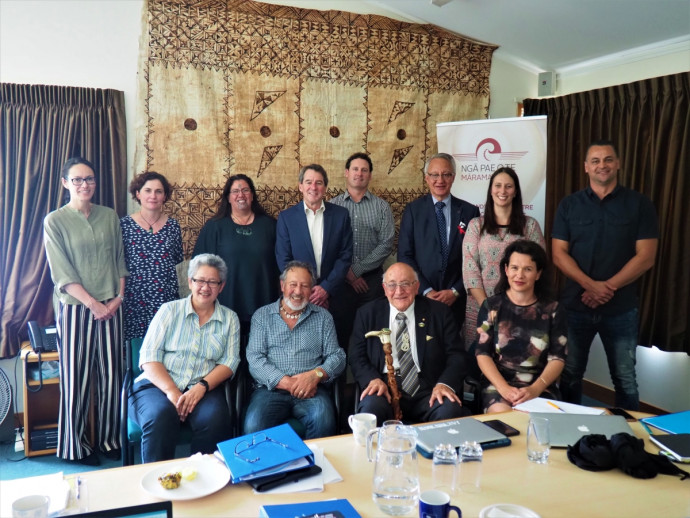2019 Inaugural Te Rangaunua Hiranga Māori Award: Fostering and exemplifying Māori research excellence

The inaugural Te Rangaunua Hiranga Māori Award, which recognises excellent, innovative co-created research conducted by Māori that has made a distinctive contribution to community wellbeing and development in Aotearoa, has been awarded to Ngā Pae o te Māramatanga, New Zealand's Māori Centre of Research Excellence, by Royal Society Te Apārangi.
Working with hundreds of whanau, hapū and iwi since 2002, Ngā Pae o te Māramatanga (NPM) has successfully led and fostered the carving out of a space for community-led mātauranga Māori, te reo and tikanga Māori science research in Aotearoa New Zealand.
NPM has led the nation by committing to building Māori engagement and leadership across the science and research sector. Its hundreds of researchers, working in partnership with diverse Māori communities around the country, work at the critical interface between mātauranga Māori and science/humanities research, having major impacts both locally, nationally and internationally.
In the absence of the infrastructure that long established disciplines such as physics, history or botany enjoy, NPM needed to develop and implement new processes and structures to support Indigenous community co-created research in a tertiary environment that is not conducive to such processes.
In building this infrastructure, NPM has helped enable the formation of a new scholarly community as well as national and international confidence in Indigenous-led research. Laying this groundwork has required:
the rapid increase of the number of Māori researchers that could design and lead critical research projects; the extension of the breadth and significance of Kaupapa Māori research; the development of transdisciplinary research methods and theories to respond to national and community need; and, the creation of appropriate and multiple outlets for the research.
One example of innovation that is giving life to community co-created research is wānanga, as not just a meeting practice but as a critical research method. Wānanga, as ‘spaces of integrity’ for mātauranga Māori, facilitate new knowledge creation in innovative ways. Wānanga on the marae provide a framework for how, why and where NPM meets together including how NPM listens to one another and how NPM engages with the kaupapa at hand. Collective NPM researcher/community wānanga are regularly held including most recently at Rānana Marae (Whanganui River Valley) and Wakatū Marae (Nelson).
NPM has enabled hundreds of community events including ones focusing on criminal justice system reform with Ngāti Kahungunu, water reform with Ngāi Tahu, and family violence reform with Te Whakaruruhau Waikato Women’s Refuge.
NPM has facilitated over 160 community partnered research projects many of which remain active, delivering outputs and impact for their Māori researchers and the Māori communities they work with.
Select Iwi /Hapū and Māori community group examples include:
- Dr Shaun Ogilvie, with Te Ātiawa ki te Tauihu o Te Waka-a-Maui, investigated the commercial feasibility of using mātauranga Māori-based fish trips to eliminate bycatch from commercial fishing;
- Dr Jamie Ataria, with Te Taiwhenua o Te Whanganui o Ōrotu, Ngāti Kahungunui Iwi Incorporation, assessed pollution and development issues in the Ahuriri Estuary;
- Dr Wayne Ngata, with Te Aitanga a Hauiti Community Marae, assembled a collection of digital taonga from voyages that visited Aotearoa between 1765-1840;
- Professors Rawinia Higgins and Poia Rewi, with Kohunga Reo National Trust and others, developed an innovative Māori language revitalisation model;
- Professor Helen Moewaka-Barnes, with Te Hiku O Te Ika Iwi Development Trust, is developing eco-health models for supporting sustainable environmental solutions.
- Dr Diane Ruwhiu, with Te Kupeka Umaka Māori ki Araiteuru Southern Māori Business Network, is building organisational cultural resilience.
- Dr Mohi Rua and Professor Darrin Hodgetts, with Te Whakaruruhau Waikato Women’s Refuge, are developing insights to promote wellbeing in times of whanau adversity.
- Associate Professor Joanna Kidman and Professor Huia Tomlins-Jahnke, with the Māori Womens’ Welfare League in Wairarapa, are considering Māori youth futures.
In 2014, the New Zealand Institute of Economic Research independently assessed the economic and social impacts of NPM research. It found that NPM has established an unprecedented and extensive network of cooperation between its partner research institutions: 80% of NPM research projects are designed and shaped by home communities, the impacts of NPM projects are localised and highly relevant to the communities involved, and NPM researchers are highly engaged with Māori communities.
The selection committee said under the successive directorships of Professors Linda Tuhiwai Smith CNZM FRSNZ, Michael Walker FRSNZ, Tracey McIntosh MNZM, Te Ahukaramū Charles Royal, Jacinta Ruru FRSNZ and Linda Waimarie Nikora FRSNZ, Ngā Pae o te Māramatanga has become a national and global exemplar for Indigenous research, featuring excellent, innovative co-created research for and by Māori.
On accepting this award, NPM past and present Directors said: “We deeply thank the foresight, ambition, generosity and resilience of the hundreds of Māori Principal Investigators, Māori postgraduate students and Māori communities throughout Aotearoa who together have forged a positive transformative legacy of Māori-led solutions for the nation. On their behalf, we are thrilled to accept this research excellence award”.
Te Rangaunua Hiranga Māori Award:
Recognises excellent, innovative co-created research, conducted by Māori, that has made a distinctive contribution to community wellbeing and development in Aotearoa.
Citation:
To Ngā Pae o te Māramatanga for successfully leading and fostering the carving out of a space for community-led mātauranga Māori, te reo and tikanga Māori science research in Aotearoa New Zealand
